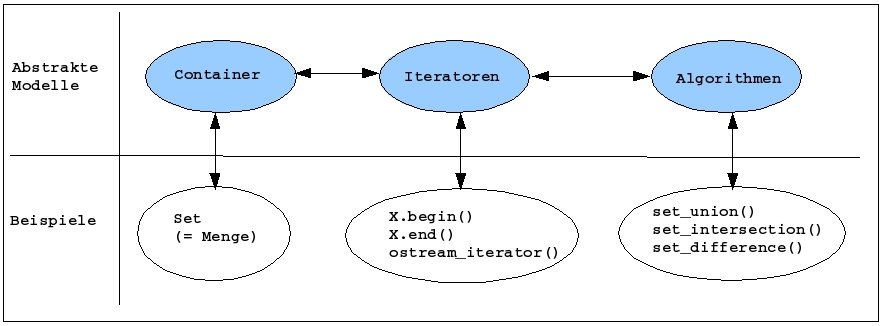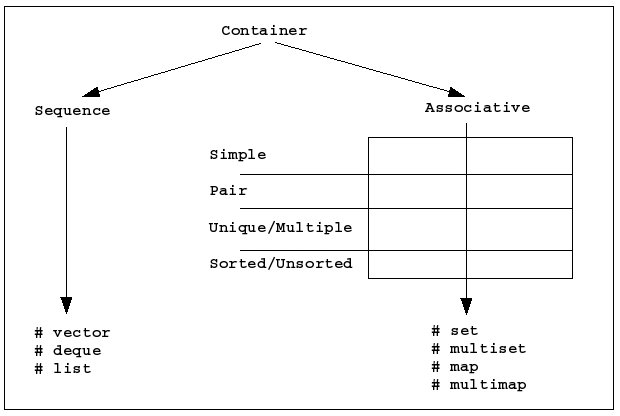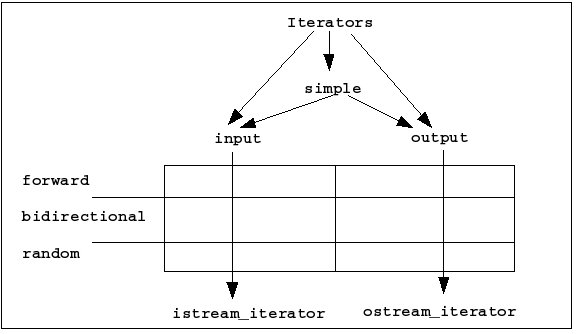
|
|
II-PPmP SS05
|
Im bisherigen Verlauf der Lehrveranstaltung wurde in stark vereinfachter Form verdeutlicht, was unter einem Softwareprojekt im Rahmen des MDA-Ansatzes der OMG zu verstehen ist. Das allgemeine Konzept wurde am Beispiel einer konkreten Problemstellung konkretisiert und illustriert. In diesem Zusammenhang sind auch erste Grundelemente der Programmiersprache C++ eingeführt worden. Insbesondere wurden neben dem Grundbegriff Klasse die Begriffe Referenz, Konstruktor, Dekonstruktor sowie Template erläutert. Auch wurde das Konzept der Ausnahmebehandlung schon besprochen sowie die Behandlung von Input und Output.
In den Vorlesunen 10+11g wird jetzt das Grundkonzept der Standard Library (STL) vorgestellt. Im Mittelpunkt stehen die Konzepte Container, Iterator sowie Algorithmus.
Das Grundgerüst der STL kann man in den Begriffen Container, Iterator und Algorithmus fassen (vgl. Schaubild).

Wechselspiel zwischen Container, Iteratoren und Algorithmen
Mit Container sind solche Klassen gemeint, die eine bestimmte Anzahl von Objekten beinhalten können, wobei diese Objekte unterschiedlich angeordnet sein können. Container enthalten für gewähnlich die Daten einer Anwendung. Iteratoren sind Objekte, mit denen man auf die Elemente eines Containers zugreifen kann. Iteratoren sind damit eine Art von Pointern. Algorithmen wiederum sind allgemeine Verfahren, in denen bestimmte Operationen mit Objekten ausgeführt werden.
Das Besondere an den STL-Algorithmen ist --neben anderen Eigenschaften--, dass sie auf die STL-Container nicht direkt zugreifen, sondern vermittels der STL-Iteratoren. Die Iteratoren bilden also gleichsam eine Schnittstelle zwischen Algorithmen und Containern. Dies funktioniert allerdings nur deshalb, weil die Iteratoren sehr allgemein gehalten sind, d.h. unabhängig vom konkreten Datentyp in einem Container sehen die Iteratoren für die zugreifenden Algorithmen gleich aus.
Container sind jene Klassen, in denen man die unterschiedlichsten Daten sammelt und sie nach unterschiedlichen Gesichtspunkten ordnet. Man unterscheidet zwei Basistypen bei Containern: (i) solche, bei denen die Werte sequentiell angeordnet sind, und solche (ii) bei denen die Werte nach Schlüsseln (keys) angeordnet sind. Container mit sequentiell angeordneten Daten nennt man Sequenz-Container und solche, in denen nach Schlüsseln geordnet wird Assoziative Container (vgl. Schaubild).

Typen von Containern
Die Kurzcharakteristik einer Sequence lautet: "A Sequence is a variable-sized Container whose elements are arranged in a strict linear order. It supports insertion and removal of elements".
Konkrete Beispiele (Instanzen, Modelle) von Sequenz-Containern sind die folgenden:
Die Kurzcharakteristik eines Assozitiven Containers lautet: "An Associative Container is a variable-sized Container that supports efficient retrieval of elements (values) based on keys. It supports insertion and removal of elements, but differs from a Sequence in that it does not provide a mechanism for inserting an element at a specific position."
Konkrete Beispiele (Instanzen, Modelle) von Assoziativen Containern sind die folgenden:
Weiterführende Beschreibungen findet man unter folgender Klassifizierung:
Beispiel fuer einen sequentiellen Container mit der Klasse vector nach Josuttis (Für Details siehe: vector)
/* The following code example is taken from the book
* "The C++ Standard Library - A Tutorial and Reference"
* by Nicolai M. Josuttis, Addison-Wesley, 1999
*
* (C) Copyright Nicolai M. Josuttis 1999.
* Permission to copy, use, modify, sell and distribute this software
* is granted provided this copyright notice appears in all copies.
* This software is provided "as is" without express or implied
* warranty, and with no claim as to its suitability for any purpose.
*/
#include <iostream>
#include <vector>
#include <string>
#include <algorithm>
#include <iterator>
using namespace std;
int main()
{
// create empty vector for strings
vector<string> sentence;
// reserve memory for five elements to avoid reallocation
sentence.reserve(5);
// append some elements
sentence.push_back("Hello,");
sentence.push_back("how");
sentence.push_back("are");
sentence.push_back("you");
sentence.push_back("?");
// print elements separated with spaces
copy (sentence.begin(), sentence.end(),
ostream_iterator<string>(cout," "));
cout << endl;
// print ``technical data''
cout << " max_size(): " << sentence.max_size() << endl;
cout << " size(): " << sentence.size() << endl;
cout << " capacity(): " << sentence.capacity() << endl;
// swap second and fourth element
swap (sentence[1], sentence[3]);
// insert element "always" before element "?"
sentence.insert (find(sentence.begin(),sentence.end(),"?"),
"always");
// assign "!" to the last element
sentence.back() = "!";
// print elements separated with spaces
copy (sentence.begin(), sentence.end(),
ostream_iterator<string>(cout," "));
cout << endl;
// print ``technical data'' again
cout << " max_size(): " << sentence.max_size() << endl;
cout << " size(): " << sentence.size() << endl;
cout << " capacity(): " << sentence.capacity() << endl;
}
gerd@kant:~/public_html/fh/II-PPmP/VL/VL10> ./vector2 Hello, how are you ? max_size(): 1073741823 size(): 5 capacity(): 5 Hello, you are how always ! max_size(): 1073741823 size(): 6 capacity(): 10
Beispiel fuer einen sequentiellen Container mit der Klasse list nach Josuttis (Für Details siehe: list)
/* The following code example is taken from the book
* "The C++ Standard Library - A Tutorial and Reference"
* by Nicolai M. Josuttis, Addison-Wesley, 1999
*
* (C) Copyright Nicolai M. Josuttis 1999.
* Permission to copy, use, modify, sell and distribute this software
* is granted provided this copyright notice appears in all copies.
* This software is provided "as is" without express or implied
* warranty, and with no claim as to its suitability for any purpose.
*/
#include <iostream>
#include <list>
#include <algorithm>
#include <iterator>
using namespace std;
void printLists (const list<int>& l1, const list<int>& l2)
{
cout << "list1: ";
copy (l1.begin(), l1.end(), ostream_iterator<int>(cout," "));
cout << endl << "list2: ";
copy (l2.begin(), l2.end(), ostream_iterator<int>(cout," "));
cout << endl << endl;
}
int main()
{
// create two empty lists
list<int> list1, list2;
// fill both lists with elements
for (int i=0; i<6; ++i) {
list1.push_back(i);
list2.push_front(i);
}
printLists(list1, list2);
// insert all elements of list1 before the first element with value 3 of list2
// - find() returns an iterator to the first element with value 3
list2.splice(find(list2.begin(),list2.end(), // destination position
3),
list1); // source list
printLists(list1, list2);
// move first element to the end
list2.splice(list2.end(), // destination position
list2, // source list
list2.begin()); // source position
printLists(list1, list2);
// sort second list, assign to list1 and remove duplicates
list2.sort();
list1 = list2;
list2.unique();
printLists(list1, list2);
// merge both sorted lists into the first list
list1.merge(list2);
printLists(list1, list2);
}
gerd@kant:~/public_html/fh/II-PPmP/VL/VL10> ./list1 list1: 0 1 2 3 4 5 list2: 5 4 3 2 1 0 list1: list2: 5 4 0 1 2 3 4 5 3 2 1 0 list1: list2: 4 0 1 2 3 4 5 3 2 1 0 5 list1: 0 0 1 1 2 2 3 3 4 4 5 5 list2: 0 1 2 3 4 5 list1: 0 0 0 1 1 1 2 2 2 3 3 3 4 4 4 5 5 5 list2:
In beiden Beispielen werden Iteratoren benutzt. Diese werden jetzt erläutert.
Ein Iterator ist ein Objekt, das auf Elemente in einem Container zeigen kann und zusätzlich mögliche Vorgänger oder Nachfolger findet.M an unterscheidet die folgenden Typen von Iteratoren (vgl. Schaubild). Ein Iterator Adaptor ist eine Klasse, die sich formal wie ein Iterator verhält, aber zusätzloiche Eigenschaften besitzt (siehe unten).

Typen von Iteratoren
Folgende Iterator Adaptoren werden in der STL unterschieden:
Insert Iteratoren
Stream Iteratoren
Reverse Interatoren
Beispiele für Insert Iteratoren:
|
Name |
Beschreibung |
|
back_inserter(container) |
Benutzt push_back() oder folgt der Ordnung |
|
front_inserter(container) |
Benutzt push_front() in setzt am Beginn ein |
|
inserter(container,pos) |
Setzt bei pos ein mittels insert() |
Das folgende kleine Programm von Josuttis zeigt alle drei Typen von Insert Iterator Adaptoren im Einsatz
/* The following code example is taken from the book
* "The C++ Standard Library - A Tutorial and Reference"
* by Nicolai M. Josuttis, Addison-Wesley, 1999
*
* (C) Copyright Nicolai M. Josuttis 1999.
* Permission to copy, use, modify, sell and distribute this software
* is granted provided this copyright notice appears in all copies.
* This software is provided "as is" without express or implied
* warranty, and with no claim as to its suitability for any purpose.
*/
/**************************************************************
*
* Minor Modifications for printouts by gerd d-h
*
****************************************************************/
#include <iostream>
#include <vector>
#include <list>
#include <deque>
#include <set>
#include <algorithm>
#include <iterator>
using namespace std;
int main()
{
list<int> coll1;
// insert elements from 1 to 9 into the first collection
for (int i=1; i<=9; ++i) {
coll1.push_back(i);
}
copy (coll1.begin(), coll1.end(), // source
ostream_iterator<int>(cout," ")); // destination
cout << endl;
// copy the elements of coll1 into coll2 by appending them
vector<int> coll2;
copy (coll1.begin(), coll1.end(), // source
back_inserter(coll2)); // destination
copy (coll2.begin(), coll2.end(), // source
ostream_iterator<int>(cout," ")); // destination
cout << endl;
// copy the elements of coll1 into coll3 by inserting them at the front
// - reverses the order of the elements
deque<int> coll3;
copy (coll1.begin(), coll1.end(), // source
front_inserter(coll3)); // destination
copy (coll3.begin(), coll3.end(), // source
ostream_iterator<int>(cout," ")); // destination
cout << endl;
// copy elements of coll1 into coll4
// - only inserter that works for associative collections
set<int> coll4;
copy (coll1.begin(), coll1.end(), // source
inserter(coll4,coll4.begin())); // destination
copy (coll4.begin(), coll4.end(), // source
ostream_iterator<int>(cout," ")); // destination
cout << endl;
}
gerd@kant:~/public_html/fh/II-PPmP/VL/VL11> g++ -o copy3b copy3b.cpp gerd@kant:~/public_html/fh/II-PPmP/VL/VL11> ./copy3b 1 2 3 4 5 6 7 8 9 1 2 3 4 5 6 7 8 9 9 8 7 6 5 4 3 2 1 1 2 3 4 5 6 7 8 9
Das folgende kleine Programm von Josuttis zeigt, wie ein Iterator auf einen Container vom Typ Liste zugreift.
/* The following code example is taken from the book
* "The C++ Standard Library - A Tutorial and Reference"
* by Nicolai M. Josuttis, Addison-Wesley, 1999
*
* (C) Copyright Nicolai M. Josuttis 1999.
* Permission to copy, use, modify, sell and distribute this software
* is granted provided this copyright notice appears in all copies.
* This software is provided "as is" without express or implied
* warranty, and with no claim as to its suitability for any purpose.
*/
#include <iostream>
#include <list>
#include <iterator>
using namespace std;
int main()
{
list<char> coll; // list container for character elements
// append elements from 'a' to 'z'
for (char c='a'; c<='z'; ++c) {
coll.push_back(c);
}
/* print all elements
* - iterate over all elements
*/
list<char>::const_iterator pos;
for (pos = coll.begin(); pos != coll.end(); ++pos) {
cout << *pos << ' ';
}
cout << endl;
}
gerd@linux:~/public_html/fh/II-PPmP/VL/VL10> g++ -o list2 list2.cpp gerd@linux:~/public_html/fh/II-PPmP/VL/VL10> ./list2 a b c d e f g h i j k l m n o p q r s t u v w x y z
Beispiel eines assoziativen Containers set in Verbindung mit Input-Iteratoren saowie einem Result-Iterator (fürv Details siehe Set)
//---------------------
//
// set3.cpp
//
// This example is taken from the public STL-site of SGI
// See: http://www.sgi.com/tech/stl/
//------------------------------
#include <iostream>
#include <set>
#include <iterator>
using namespace std;
// Hilfsfunktion lt := less-than, kleiner als
// Vergleicht zwei Zeichenketten
struct ltstr
{
bool operator()(const char* s1, const char* s2) const
{
return strcmp(s1, s2) < 0;
}
};
int main()
{
// Bereitstellung von zwei gewoehnlichen Arrays vom Typ char:
const int N = 6;
const char* a[N] = {"isomer", "ephemeral", "prosaic",
"nugatory", "artichoke", "serif"};
const char* b[N] = {"flat", "this", "artichoke",
"frigate", "prosaic", "isomer"};
// Es werden jetzt drei Mengen-Objekte angelegt: A, B und C.
// In allen drei Faellen wird der Typ des Schluessels (= Key) auf char* festgelegt,
// d.h. die Elemente dieser Mengen sind vom Typ Pointer auf Zeichenkette.
// Ferner wird eine Vergleichsfunktion ltstr angegeben.Diese Vergleichsfunktion kann
// zwei beliebige Elemente in der Menge vergleichen. Sie liefert true (=1) zurueck, wenn das
// erste Argument nicht mit dem zweiten Argument uebereinstimmt, sonst false (=0).
set<const char*, ltstr> A(a, a + N);
set<const char*, ltstr> B(b, b + N);
set<const char*, ltstr> C;
cout << "Set A: ";
copy(A.begin(), A.end(), ostream_iterator<const char*>(cout, " "));
cout << endl;
cout << "Set B: ";
copy(B.begin(), B.end(), ostream_iterator<const char*>(cout, " "));
cout << endl;
cout << "Union: ";
set_union(A.begin(), A.end(), B.begin(), B.end(),
ostream_iterator<const char*>(cout, " "),
ltstr());
cout << endl;
cout << "Intersection: ";
set_intersection(A.begin(), A.end(), B.begin(), B.end(),
ostream_iterator<const char*>(cout, " "),
ltstr());
cout << endl;
set_difference(A.begin(), A.end(), B.begin(), B.end(),
inserter(C, C.begin()),
ltstr());
cout << "Set C (difference of A and B): ";
copy(C.begin(), C.end(), ostream_iterator<const char*>(cout, " "));
cout << endl;
}
gerd@kant:~/public_html/fh/II-PPmP/VL/VL10> ./set3 Set A: artichoke ephemeral isomer nugatory prosaic serif Set B: artichoke flat frigate isomer prosaic this Union: artichoke ephemeral flat frigate isomer nugatory prosaic serif this Intersection: artichoke isomer prosaic Set C (difference of A and B): ephemeral nugatory serif
(Für Details siehe Map)
/* The following code example is taken from the book
* "The C++ Standard Library - A Tutorial and Reference"
* by Nicolai M. Josuttis, Addison-Wesley, 1999
*
* (C) Copyright Nicolai M. Josuttis 1999.
* Permission to copy, use, modify, sell and distribute this software
* is granted provided this copyright notice appears in all copies.
* This software is provided "as is" without express or implied
* warranty, and with no claim as to its suitability for any purpose.
*/
#include <iostream>
#include <map>
#include <string>
#include<iterator>
using namespace std;
int main()
{
/* create map / associative array
* - keys are strings
* - values are floats
*/
typedef map<string,float> StringFloatMap;
StringFloatMap stocks; // create empty container
// insert some elements
stocks["BASF"] = 369.50;
stocks["VW"] = 413.50;
stocks["Daimler"] = 819.00;
stocks["BMW"] = 834.00;
stocks["Siemens"] = 842.20;
// print all elements
StringFloatMap::iterator pos;
for (pos = stocks.begin(); pos != stocks.end(); ++pos) {
cout << "stock: " << pos->first << "\t"
<< "price: " << pos->second << endl;
}
cout << endl;
// boom (all prices doubled)
for (pos = stocks.begin(); pos != stocks.end(); ++pos) {
pos->second *= 2;
}
// print all elements
for (pos = stocks.begin(); pos != stocks.end(); ++pos) {
cout << "stock: " << pos->first << "\t"
<< "price: " << pos->second << endl;
}
cout << endl;
/* rename key from "VW" to "Volkswagen"
* - only provided by exchanging element
*/
stocks["Volkswagen"] = stocks["VW"];
stocks.erase("VW");
// print all elements
for (pos = stocks.begin(); pos != stocks.end(); ++pos) {
cout << "stock: " << pos->first << "\t"
<< "price: " << pos->second << endl;
}
}
gerd@kant:~/public_html/fh/II-PPmP/VL/VL11> g++ -o map1 map1.cpp gerd@kant:~/public_html/fh/II-PPmP/VL/VL11> ./map1 stock: BASF price: 369.5 stock: BMW price: 834 stock: Daimler price: 819 stock: Siemens price: 842.2 stock: VW price: 413.5 stock: BASF price: 739 stock: BMW price: 1668 stock: Daimler price: 1638 stock: Siemens price: 1684.4 stock: VW price: 827 stock: BASF price: 739 stock: BMW price: 1668 stock: Daimler price: 1638 stock: Siemens price: 1684.4 stock: Volkswagen price: 827
(Für Details siehe Multimap )
Das nachfolgende Beispiel von Josuttis benutzt Formattierungsanweisungen für cout.Für eine ausführliche Auflistung und Besprechung sei auf den C++-Standard verwiesen sowie auf das hervorragende STL-Buch von Josuttis.
|
Name |
Beschreibung |
|
setf(flags) |
Setzt flags als zusätzliche Flags und liefert die letzten flags zurück |
|
unsetf(flags) |
Setzt flags wieder zurück |
|
setw(val) |
Setzt die Feldbreite für Input und Output auf den Wert val |
|
setfill(c) |
Definiert c als Füllcharakter |
|
right |
Ausrichtung nach rechts |
|
left |
Ausrichtung nach links |
/* The following code example is taken from the book
* "The C++ Standard Library - A Tutorial and Reference"
* by Nicolai M. Josuttis, Addison-Wesley, 1999
*
* (C) Copyright Nicolai M. Josuttis 1999.
* Permission to copy, use, modify, sell and distribute this software
* is granted provided this copyright notice appears in all copies.
* This software is provided "as is" without express or implied
* warranty, and with no claim as to its suitability for any purpose.
*****************************************************************
*
* some minor changes for output by gerd d-h
*
***********************************************************/
#include <iostream>
#include <map>
#include <string>
#include <iomanip>
#include<iterator>
using namespace std;
int main()
{
// define multimap type as string/string dictionary
typedef multimap<string,string> StrStrMMap;
// create empty dictionary
StrStrMMap dict;
// insert some elements in random order
dict.insert(make_pair("day","Tag"));
dict.insert(make_pair("strange","fremd"));
dict.insert(make_pair("car","Auto"));
dict.insert(make_pair("smart","elegant"));
dict.insert(make_pair("trait","Merkmal"));
dict.insert(make_pair("strange","seltsam"));
dict.insert(make_pair("smart","raffiniert"));
dict.insert(make_pair("smart","klug"));
dict.insert(make_pair("clever","raffiniert"));
// print all elements
StrStrMMap::iterator pos;
cout.setf (ios::left, ios::adjustfield);
cout << ' ' << setw(10) << "english "
<< "german " << endl;
cout << setfill('-') << setw(20) << ""
<< setfill(' ') << endl;
for (pos = dict.begin(); pos != dict.end(); ++pos) {
cout << ' ' << setw(10) << pos->first.c_str()
<< pos->second << endl;
}
cout << endl;
// print all values for key "smart"
string word("smart");
cout << word << ": " << endl;
for (pos = dict.lower_bound(word);
pos != dict.upper_bound(word); ++pos) {
cout << left << setw(12) << setfill('_') << pos->second << endl;
}
// print all keys for value "raffiniert"
word = ("raffiniert");
cout << word << ": " << endl;
for (pos = dict.begin(); pos != dict.end(); ++pos) {
if (pos->second == word) {
cout << right << setw(12) << setfill('_') << pos->first << endl;
}
}
cout << oct << cout.flags() << endl;
}
gerd@kant:~/public_html/fh/II-PPmP/VL/VL11> g++ -o mmap1b mmap1b.cpp gerd@kant:~/public_html/fh/II-PPmP/VL/VL11> ./mmap1b english german -------------------- car Auto clever raffiniert day Tag smart elegant smart raffiniert smart klug strange fremd strange seltsam trait Merkmal smart: elegant_____ raffiniert__ klug________ raffiniert: ______clever _______smart 10202
In den vorausgehenden Beispielen wurde schon verschiedentlich die copy()-Funktion benutzt. De copy()-Funktion wie auch andere funktionen wie z.B. sort(), set_intersection() usw. sind Algorithmen, die mit Hilfe von Iteratoren auf Container zugreifen. einige Beispiele für solche Algorithmen sind die folgenden:
Ein einfaches Beispiel für den sort()-Algorithmus findet sich im folgenden Programm:
//------------------
//
// ioiter0.cpp
//
//---------------------------
#include <iostream>
#include <vector>
#include <algorithm>
#include <iterator>
using namespace std;
int main()
{
vector<int> coll;
copy(istream_iterator<int>(cin), //source
istream_iterator<int>(), // EOF := Ctrl-D
back_inserter(coll)); //destination
coll.insert(coll.begin(),100);
// sort elements
sort (coll.begin(), coll.end());
copy(coll.begin(), coll.end(), // source
ostream_iterator<int>(cout,"\n")); // destination
return(1);
}
gerd@kant:~/public_html/fh/II-PPmP/VL/VL10> ./ioiter0 22 33 6 7654 4 8768 4 6 22 33 100 7654 8768
Noch zu schreiben....